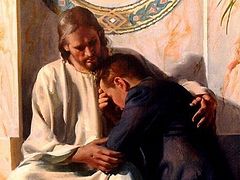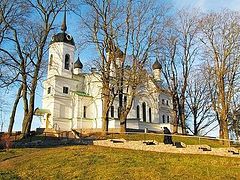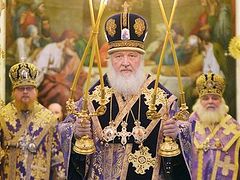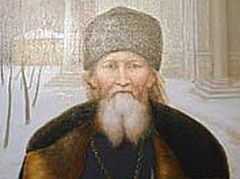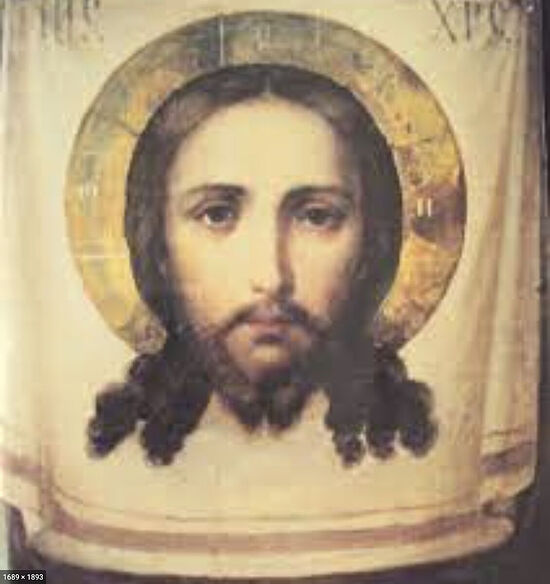 The icon of the Savior "Not Made With Hands".
The icon of the Savior "Not Made With Hands".
For the Son of man is not come to destroy men's lives, but to save them (Lk. 9:56).
This day, which we celebrate in honor of our Savior Jesus Christ Who left an image on a napkin of His holy Face—an image not created by human hands—inspires us, brothers, to speak of His inexpressible love and mercy for the human race. Being the brightness of [the Father’s] glory (Heb. 1:3) and the image of the invisible God (Col. 1:15), in the depths of Whom He abode from eternity, He was made man and became visible, opening for all the inexhaustible wellspring of divine mercy and love. Continually surrounded by people, He called all to Himself, promised to give peace, healed infirmities of soul and body, and drew all to Himself with the inexplicably sweet words of His teaching and the extraordinarily meek appearance of His divine countenance.
The hearts of people in the pagan world who lived before the coming of Christ did not know love; for the entire lives of their hearts were exhausted by serving the passions and vices so destructive to soul and body. Even the Jewish people, who were being prepared for the coming of the Savior, little understood what God’s love is; and even Christ’s chosen apostles had not yet during the Lord’s earthly life been freed from the desire for earthly glory, from mutual envy, and from weak faith with respect to their Teacher. And now the One has appeared Who made tangible to all people living on earth the gentle breeze of divine love in hearts fainting from sorrows; Who poured out succor to souls enslaved in service of iniquities, allowing them to feel the weight that this service had placed upon them, and the joy and lightness of fulfilling God’s law. All hurried to Him, to hear Him and to be healed of their infirmities, or simply to open their souls so weary from the passions and sorrows of life, to the breath of love that came from Him. How wonderful and blessed was the life of those people who continually saw before them the face of the Savior—comforting, healing, instructing, and inexpressibly drawing them to Himself by His love! Truly blessed were their eyes, which saw what they saw—what many prophets and kings desired to see or hear, yet neither saw nor heard (cf. Lk. 10:23–24)! If human love can make our lives so joyful and blessed, then how much more blessed were those people who were in close communion with the One Who, calling Himself the Son of Man according to His love for the human race, was God Himself—till then invisible to the world in the fullness of His divine life and glory!
Nevertheless, we see that few people were themselves filled with that spirit of love so tangibly manifest in every word and deed of the Father’s Divine Emissary. Others not only did not accept Him, they even tried to kill Him, because their sinful lives, exposed in all clarity by the “Light of the World” (Jn. 8:12) Who came to earth, could not stand before the shining brightness of His divinity and tried in every way to arouse those led by it to oppose the light. Therefore brothers, in calling those people blessed who saw the Savior and who were in visible communion with Him, we shall not grieve that we were deprived of this vision and communion, but rather that often we join ourselves to the great hosts of people who renounced their Savior. For, constantly embracing the vanity of everyday cares, serving sin more than God—do we often strive with all our souls toward the One Who saves us from sin and death? After all even now, though we have no visible contact with Him, we can nevertheless always be in spiritual communion with Him; for He promised to be with His Church invisibly unto the end of the world (Mt. 28:20).
The path to such invisible communion with Him is our constant prayer to Him, which would illumine our every word, every movement, and, making God our constant Intercessor and Guide, would allow us to easily bear every sorrow and every sadness without any despondency. If our souls faint in faith during these sorrows, for a long time not seeing any consolation from prayer, and seeking some kind of visible consolation, even then our loving Savior will not allow it to perish, for He has never left His Church without care, and never will. He has left the spirit of love with which He healed human souls during the time of His earthly life in the hearts of His true followers, so that the world would stand and be enriched with the fruits of these holy people’s virtues, which make up that which shall stand therein, [which] shall be a holy seed (Is. 6:13). Many of these have not yet left the earth, but continue to be lamps on it and healing for the souls of people living in the world.
Let each person in those moments, when the sorrowing soul especially calls out to God and finds no consolation, turn his gaze to these people who are filled with Christ’s love. He will especially find such people within the walls of holy monasteries; and that is why monasteries draw to themselves so many people living in the world. Then the soul will again easily enter into communion with God and will always find its Savior in Him. Amen.


